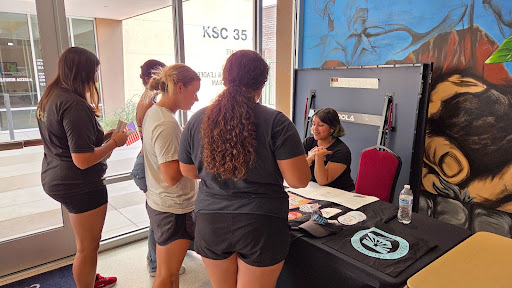Students should start saving during college, expert says
Nikki Waldmann
Mesa Legend
 For young adults who graduate after high school and go on to attend college, most usually stay at home or make the choice to live alone; either in a dorm or in a home of their own. Students who choose to live at home with mom and dad during this time typically aren’t thinking about long term goals. On the other hand, students who move out and live on their own usually need to think about financial planning ahead of time. Planning how the student’s money will be broken up and spent can consist of many important necessities such as student loans, gas, food, and rent.
For young adults who graduate after high school and go on to attend college, most usually stay at home or make the choice to live alone; either in a dorm or in a home of their own. Students who choose to live at home with mom and dad during this time typically aren’t thinking about long term goals. On the other hand, students who move out and live on their own usually need to think about financial planning ahead of time. Planning how the student’s money will be broken up and spent can consist of many important necessities such as student loans, gas, food, and rent.
Also included are the not-so-important wants such as a brand-new cell phone, eating out every day, or buying clothes. When asked if he thought about future financial planning, NAU student Austin Villas replied, “I’ve thought mostly about finding a job that fits me but still pays well for my future. I want a long term career to help me and my family.” “It’s never too early to start thinking of financial planning,” said Richard F. Grant, Jr., president, CEO and financial advisor of RFG Capital Management Inc. “The younger you start the better you’ll be.”
Thinking of long-term financial planning is never a bad thing nor does it mean a person is getting old — it simply means that they are thinking ahead for the future. Doing something as simple as starting a savings account with the local bank and putting away little amounts at a time can add up for things a person may want or need in the future. But for long-term savings an IRA (individual retirement account) would be the best bet for growing money for retirement. Fidelity investments defined an IRA as, “an account set up at a financial institution that allows an individual to save for retirement with tax-free growth or on a tax-deferred basis.” “I would go though and make a budget for the student and have them save a minimum of $25 a month, and show them what that $25 can do for them in the long run and how it can accumulate over time,” Grant said. “Protocol is, you never touch long-term money ever,” Grant added.
Long-term money would be things such as saving bonds or saving accounts held at any local bank. In financial terms longer-term money would be the money used toward retirement. Grant could not stress enough how important it is and how much discipline it takes not to touch the long term accounts. “At the end of the day if you start to touch long-term money you won’t have money in the long term for retirement.” Years down the road, if a person has not touched the long-term accounts, they can plan to live comfortably compared to someone who took funds out of their long-term account and now must dig into their pockets for nickels and dimes. “I look and calculate my income weekly and then subtract my expenses, prioritized from the most important that I’ll have a week by week and make sure that I’ll be able to make it and if not cut off expenses I may or may not need like eating out, accessories, or going out with friends,” said Nate Cooper, a student at Grand Canyon University. “When it comes to financial matters prioritizing wants and needs is a huge concern so that you aren’t spending money where you don’t have it.”
Relying on the government for such things as retirement and not taking it upon oneself to properly save, or failing to create accounts that will accumulate over time could result in not being able to maintain the standard of living one might be accustomed to. Social Security will not provide enough money on its own to live off of comfortably. Grant advises, “It’s not freezable, the government is not always going to be there to bail people out. It’s just not sustainable.” To get financial advice and to set up an appointment with Richard Grant Jr., email info@rfgcapital.com or call direct (480) 988-6601.









